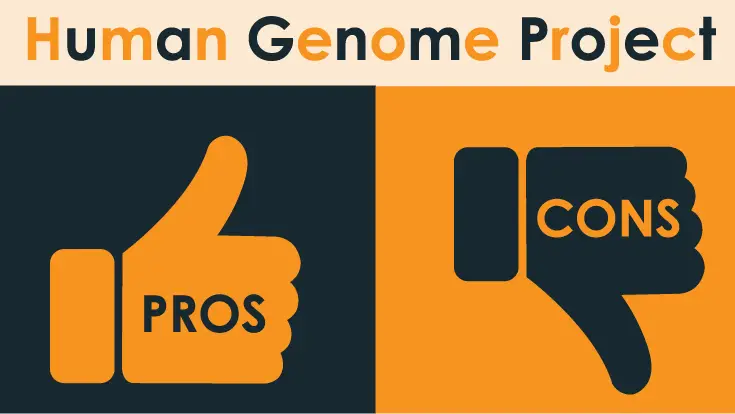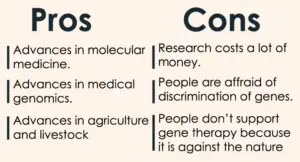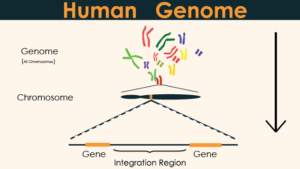
11 Untold Human Genome Project Pros and Cons That You Don’t Know
The human genome project is a classic multinational project based on research. It was set with the aim to figure out all the DNA base pairs. Before looking at the human genome project pros and cons, let’s first discuss a bit about what actually human genome project was and what it conveys to us.
It continues to be a massive collegial biology-based project. the idea for the initiative came in 1984 by the United States government. The project was publicized in 1990 but in actual was declared completed in april 14, 2003.
This was budgeted by the US Government via NIH (National Institute of Health) and additionally by other organizations around the world.
Parallelly another project was happening by a corporation named Celera which was outside the government control. The largest sequencing activities were conducted under government sponsorship in around 20 research institutes and universities in the US, China, Germany, Spain, UK, France, and Japan.
HGP was intended to have a mind map of all the nucleotides accommodated in the whole human DNA/genome which are around 3 billion. the genome that every person has is unique in each and there is no chance that any of them match.
HGP includes the managed sequencing of a bunch of humans and then compiling them to get a whole chromosomal mind map. Consequently, it ends up with a mosaic not representing any person
Now come to our topic of focus without wasting any time.
Human Genome Project Pros and Cons Step By Step:

PROS Of Human Genome Project:
- It can assist more further than solely humans. We’ve taken our comprehension of the human genome and applied that science to different sorts of life. We currently realize that creatures and plants have their own novel genome also, a\we are now able to grow plants that have better characteristics than existing. It assisted massively with making organisms a lot more beneficial than they were before (genetically Modified organisms). In the two endeavors, we’re pursuing the disease disposal that once profoundly affected farming.
- It could enhance the criminal justice procedure. The human genome is the only thing in us that makes each of us unique. Due to the DNA studies which were essential for HGP, we have started to build up a procedure known as DNA fingerprinting. By opposing DNA specimens collected from two distinct individuals, we have another strategy for recognizing individuals who may have carried out an offence. As the logic following this method keeps on improving, our frameworks of wicked justice can turn out to be more powerful.
- It would permit us to customize medicine for more powerful treatment cycles. Drugs, before the genome was planned, depended on a one size fits all solution. The medication either worked for you, or it didn’t. One of the rapidly developing fields in medicine is within the segment of pharmaceutical. Many of the advancements that took place in the shape of modern medicines are due to the HGP work in actuality.
- It assisted with the boosted economy. The HGP was quite fruitful from a financial stance. During its season of activity, extended than 4 million individuals were utilized by the venture. It made an approximately $1 trillion economic jump. We’re actually feeling the aberrant impacts of HGP in medication and science too. Various positions presently exist as a research result and workout that the undertaking finished.
- It could assist in disease detection and prevention related to humans. As we become more acquainted with additional data about the human body, we can figure out to cure, manage and understand certain complications. Indeed, even hereditary conditions could be dealt with, even cured, due to the work directed by the HGP. Figuring out our hereditary characterization meant that doctors could detect medical complications were more conviction, regardless of whether they are uncommon. This would prompt all the more early recognition occurrences. Over the long run, the forecast rate would increment.
- It can also be advantageous in exact disease diagnosis in such a way that now doctors can make more precise demonstrative strategies for specific conditions that are hard to analyze at a beginning phase.
CONS:
- It could turn into the hereditary bigotry establishment. In the event that humans can be designed (designer babies) with a certain goal in mind through data created by the HGP, at that point we would make the establishment for another type of “haves” versus “have nots.” which could not be a win-win approach. The individuals who could manage the cost of the methodology to make hereditarily exclusive people would have a favorable position over the individuals who proved unable. After some time, this could grant itself toward social orders that favor “planned/designer” individuals over natural individuals by nature. That would make another type of prejudice that is put together not with respect to skin tone, sex, or gender inclinations, yet on the real hereditary composition of the person.
- It could build up a pattern in “designer babies”. With a capacity to control the essential human genes, we gain the capacity to make explicit hereditary profiles. Multiplication would turn out to be more about what should be possible in a research facility. In spite of the fact that this may fortify the general hereditary humankind profile with certain key characteristics, it would likewise make social orders where everybody was basically the equivalent if there was sufficient capital included.
- Its data could be utilized to shape new weapons. Hereditary data could be utilized to explicitly tailor weapons to center on populace socioeconomics. When utilized, the weapons would center on a specific hereditary profile, killing all individuals with that profile from human development. That would lessen the measure of basic harm caused by usual war, making it an alluring alternative for countries hoping to acquire more global assets.
- It might cause misfortune in human variety. What makes humankind such a solid race is its variety. Despite the fact that variety can have negative segments to it, for Instance, mutations or hereditary imperfections. it likewise fortifies us from multiple points of view. Through variety, we increase new points of view. We have greater innovativeness. We even have a more grounded actual base for our general hereditary profile as species. In the event that we develop towards limiting the hereditary pool for humankind as opposed to growing it, at that point we may get more fragile as a race.
- It would be generally open to wealthy societies which could be more harmful. the logic that led the HGP advancements were cooperative within the research stage of the project. There is no assurance that a coordinated effort would reach out to the commonsense use of advancements in this field. In many businesses, the nations with the most abundance would increase first admittance to new advancements. That would mean the hole between the growing and grown world would keep on developing.
- The increased stress levels in people in such a way that people could be detected with complications that they may develop ahead in the future and spend their lives extremely in the stress before getting it in actual.
watch the video related to the human genome project pros and cons to get better insights:
after going through the human genome project pros and cons let’s read more stuff related to it to have a better understanding.
Human Genome Project Ethical Issues:
Human genome project ethical issues have prodded a lot of concern from the overall population and analysts working inside the task itself. These issues lead to the development of the ELSI panel of this project.
Following are issues regarding HGP:
Safety
Because of the chance of askew impacts (alters in some unacceptable spot) and mosaicism (when a few cells convey the alter yet others don’t), safety is an essential concern. Ethicists and scientists who have composed and spoken about genome altering, for instance, those present at the International Summit on Human Gene Editing, usually admit that till germline genome altering is esteemed safe through research, it should never be utilized for clinical procreative purposes, the danger cannot be confirmed by the inherent advantage.
A few scientists contend that there may never be a present genome altering in incipient organisms (embryonic) will offer an advantage more prominent than that of existing techniques, for instance, in-vitro fertilization and preimplantation genetic diagnosis.
Nevertheless, bioethicists & researchers recognize that sometimes, germline altering can speak needs that are not satisfied by PGD. This incorporates when both imminent guardians are homozygous for an illness causing alteration; instances of polygenic problems, which are affected by more than one quality (the two of them have two duplicates of the variation, so the entirety of their progeny would be relied upon to have the illness); and for families who object to certain components of the PGD cycle.
A few specialists and bioethicists are worried that any genome altering, in any event, for remedial employments, will begin us on a dangerous incline to utilizing it for non-restorative and enhancement purposes, which many view as disputable. Others contend that genome altering, when demonstrated protected and compelling, ought to be permitted to fix hereditary infection (and for sure it is a good imperative). They accept that worries about improvement should be overseen through guidelines and approaches.
Ultimately, analysts on the issue are worried that the utilization of genome altering for conceptive purposes will be managed diversely inside and outside of the U.S., prompting utilizes thought about offensive to the American public. These contentions refer to the to a great extent self-managed conditions of the conceptive facilities that offer PGD and IVF and the current contrasts in guidelines among various nations.
Informed Consent:
A few people stress that it is difficult to acquire educated assent for germline treatment in light of the fact that the patients influenced by the alters are the incipient organism and people in the future. counting comparatively confounded choices, for example, PGD with IVF. Analysts and bioethicists likewise stress over the chance of acquiring really educated assent from forthcoming guardians as long as the dangers of germline treatment are obscure.
Equity and justice:
A few people stress that it is difficult to acquire educated assent for germline treatment in light of the fact that the patients influenced by the alters are the incipient organism and people in the future. counting comparatively confounded choices, for example, PGD with IVF. Analysts and bioethicists likewise stress over the chance of acquiring really educated assent from forthcoming guardians as long as the dangers of germline treatment are obscure.
Genome Editing Involving Embryos:
Numerous individuals have good and strict issues with the utilization of human undeveloped organisms for research.
Government reserves can’t be utilized for any examination that makes or annihilates incipient organisms. Furthermore, NIH doesn’t subsidize any utilization of quality altering in human incipient organisms.
While NIH won’t subsidize quality altering in human undeveloped organisms as of now, numerous bioethical and exploration bunches accept that examination utilizing quality altering in incipient organisms (embryo) is significant for horde reasons, counting to address logical inquiries regarding human science, as long as it isn’t utilized for conceptive purposes at this time.
Some nations have just permitted genome-altering studies on nonviable incipient organisms also, others have endorsed genome-altering research concentrates on practical incipient organisms. By and large, research that is directed in undeveloped organisms could utilize suitable or nonviable embryo extra from IVF. Each case has its own ethical contemplations.

Why is the Human Genome Project Is Important?
The human genome project has a lot importance due to the fact that is utilizes DNA data to evolve modern techniques to cure, treat, or for the prevention of many ailments out there that may lethal to mankind. The way from gene detection to influensive treatments is long and laden up with many challenges.
The HGP aids to manage cooperations at the multinational level. In amid 2k HGP leaders at the international level confirmed that human genome rough drafts had been finished a year in front of the timetable.
The draft grouping is capable to give a scaffold arrangement over the vast majority of the human genome.
What Did the HGP Accomplish?
HGP has a high value in the field as well as in humankind that accomplishes a lot more than expected. It made us capable for the first time in history to examine the whole human gene pool. It also opened many ways and made us able to make new technologies in this world.
Ultimately is also proved that humans are unique creatures of nature.
Conclusion From Human Genome Project Pros and Cons
The human genome project pros and cons have revealed to us that by having more hands-on researching who we are, we still able to improve the world outside. Ongoing interests by the venture will be accessible for in excess of a generation. Simultaneously, in any case, we should find a way to keep this data from going into some unacceptable/black hat hands.
You may also enjoy reading: